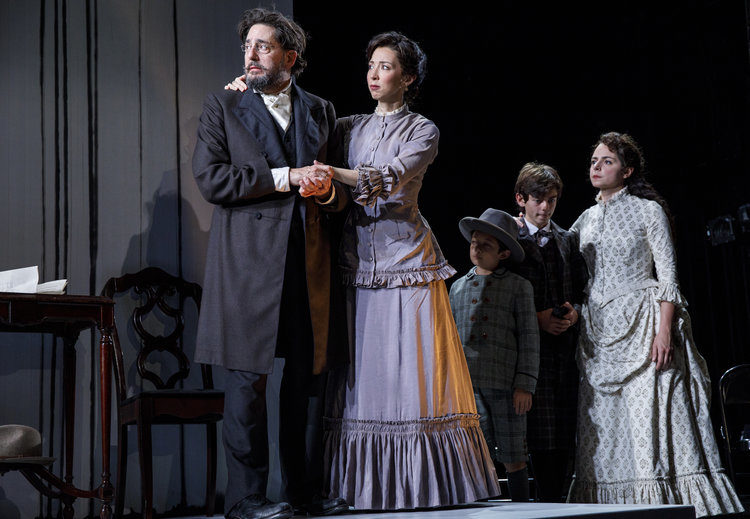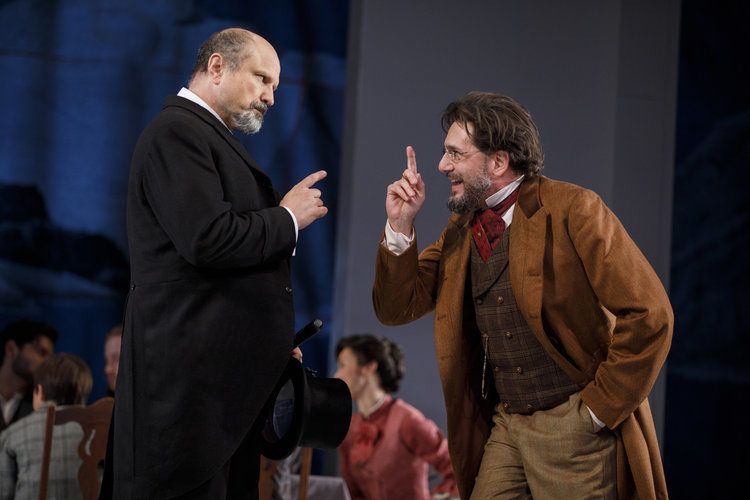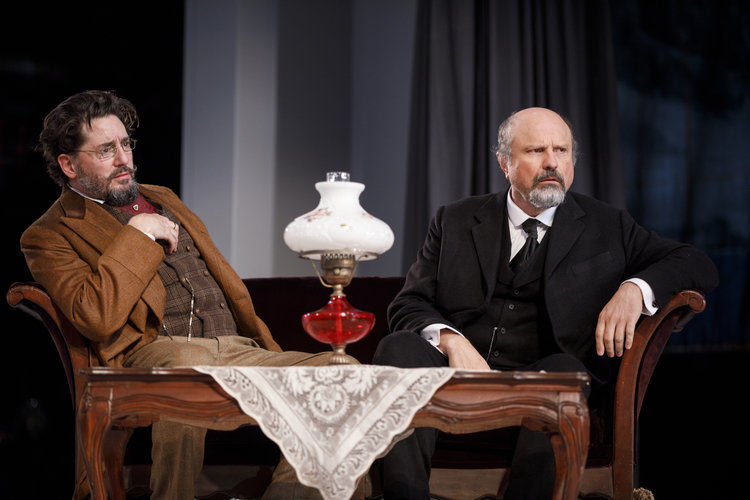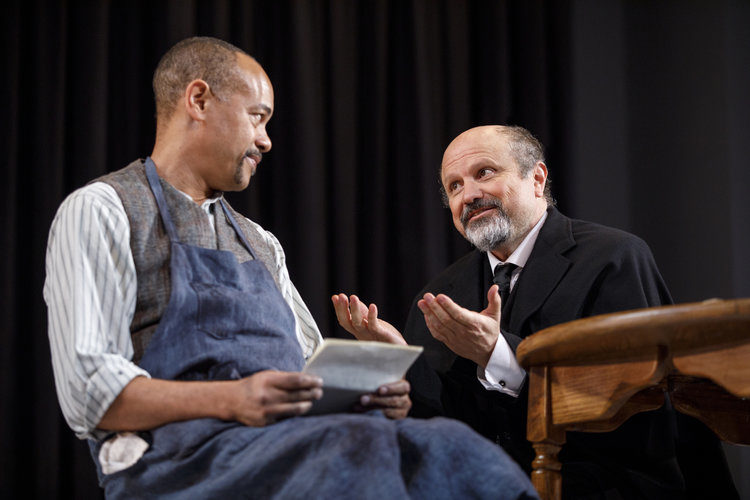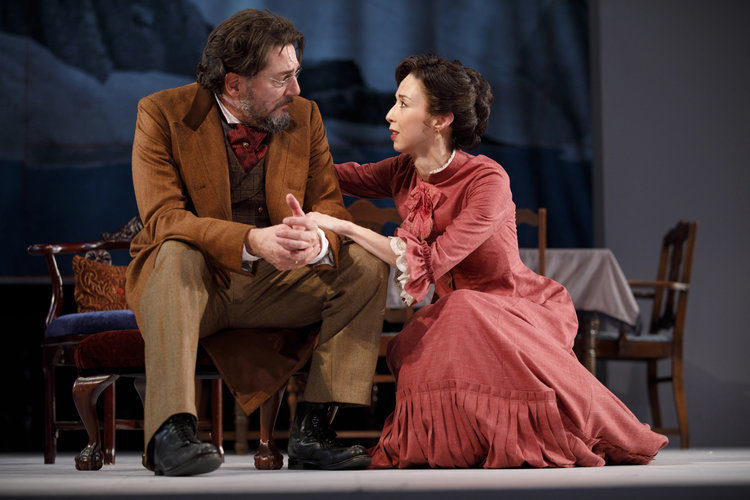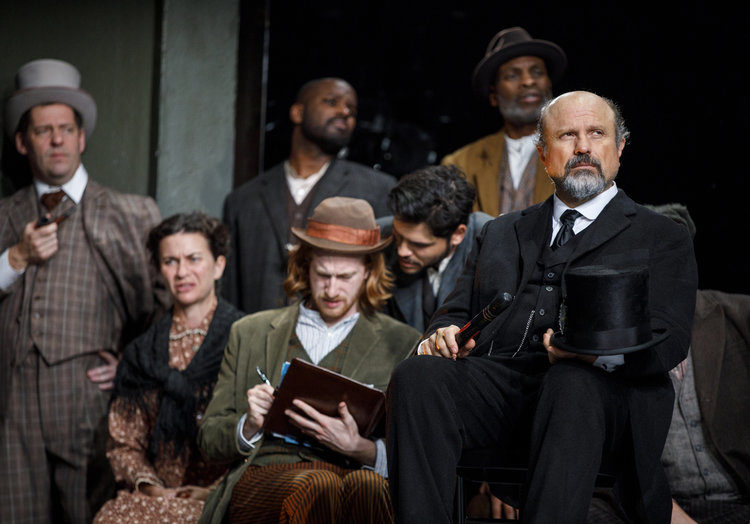Thanks to Trump’s designation of the press as “the enemy of the people,” the question of what exactly that phrase means is in the air again. In the playbill for the Yale Repertory Theatre production of Henrik Ibsen’s An Enemy of the People, directed by James Bundy from a new translation by Paul Walsh, we are apprised of the many times in history that some party or policy or organization has aimed that epithet at an antagonist. In the play, Dr. Thomas Stockmann (Reg Rogers) has the phrase hurled at him due to his discovery of information that would undermine his town’s comfortable status quo with an inconvenient truth.
Tanneries upstream have polluted the waters of the town’s famed spa, making its once healthful springs a source of slow poisoning. The environmental threat of that truth and the way in which the powers that be dismiss the dangers in favor of keeping the economy running makes the plot device analogous to everything from chemical contamination to radiation to fracking to global warming to the shark in Jaws. The town’s mayor, Peter Stockmann (Enrico Colantoni), who would rather table the findings, is the brother of Dr. Stockmann, a fact that adds an amusing element of sibling rivalry to the power struggle.
As played by Reg Rogers and Enrico Colantoni the brothers are vastly entertaining, and that’s a very strong component of this production. While maintaining a grasp of the political and polemical aspects of the material, Bundy never loses sight of the play’s comedy. Ibsen wrote a human story, not a political tract. The playwright himself was uncertain whether to call the play a comedy or a drama, and that’s because he is willing to make fun of all sides—both conservative and liberal and moderate—for the sake of dramatic effect. Ibsen tends to assert the heroic stance of the loner, in the end. Along the way, he pokes fun at the press, special interests, the arrogance of intellectuals and elitists, small-town Schadenfreude, cowardice, hypocrisy, bullies, and sexism.
In Walsh’s updating, the range of targets doesn’t feel scattershot. The tone is very different from the production of David Harrower’s adaptation, Public Enemy, directed by Hal Brooks, that played in New York last year in the months leading up to the election. That show had a hectoring quality, making us both fear the democratic process—election of a know-nothing by a bunch of know-nothings, which is how Dr. Stockmann sees majority rule—and want to take part in it to rectify its abuses. Ibsen’s play, in Walsh and Bundy’s hands, is nimbler, letting phrases like “the free liberal press” sound naïve in the mouths of its champions, but also a worrisome target of the demagoguery that becomes the keynote of public commentary and civic leadership as sides get drawn. By putting the dispute “in the family,” Ibsen indicates how power can often seem a personal asset of the few. These two men, in all their self-serving egotism, have the fate of the entire town in their hands.
Rogers’ performance, funny, breathy, agitated, conceited, goes a long way to making this play a fascinating portrait of a certain type: The well-intentioned man of science, convinced of an intellectual superiority that others should recognize by giving full assent to his views. It’s not that he’s overbearing, exactly, but his manner indicates a restless mind barely held in check by social niceties. He is beloved of his daughter Petra (played with conviction by Stephanie Machado) who aspires to more than the wifely duty her mother excels at.
Dr. Stockmann’s sweeping personality is met by Colantoni’s terse and heavy tones as the mayor. He not only wants to keep the spa in business, but the fact that the current problems stem from decisions he made when the spa was created means that the new information would spell his political death. Colantoni gives Peter Stockmann a judiciousness that seems genuine even if it is a cover to dodge his worst fears and nightmares. No one can really “win”—Thomas’ victory will be a hard blow for the town, though ultimately for the future good; Peter’s victory will be very costly, in the long run, but will give the people what they—in their guarded ignorance—want.
Everyone has an iron in the fire, not least the publisher Aslaksen (Tyrone Mitchell Henderson), a lively moderate who ends up sticking with the mayor, for political reasons. And that means the pressmen Hovstad (Bobby Roman) and Billing (Ben Anderson), initially critical of the mayor, fall into line too. In Act Two, Ibsen makes the about-faces for the sake of personal interest almost dizzying, but no more so than the kinds of bald-faced retractions of stated—or tweeted—convictions we’re all too familiar with these days. The cast does a good job showing us men who aren’t malicious but who pride themselves on knowing which way the wind is blowing.
As Thomas Stockmann’s put-upon family, Joey Parsons shines as Mrs. Catherine Stockmann. She has a gracious manner in the presence of company and shows, in a nicely mimed moment, a shrewd sense of her husband’s tendency to grandstand. The fact that she risks everything for her husband’s convictions, which are strengthened by his deep need to prove his brother wrong, makes her “stand-by-your-man” loyalty compelling rather than meek. The family seated onstage during Act Two’s town meeting creates a visual support to Dr. Stockmann’s view of himself as the only right-thinking individual. We sense their ostracization at once.
During that scene, toxic sludge makes its way down the high walls of Emona Stoykova modernistic and movable set. It’s a nice visual correlative of the spreading poison in the water and of the poisonous political farce being played out in the town. The set, open to the wings, works against the kind of drawing room set more typical for Ibsen, making the drama feel more deliberately theatrical, complete with an outdated-looking backdrop to signal a Norwegian landscape.
In their willingness to be steered by those in power without demanding accountability, the townsfolk in Ibsen’s play are a cautionary example. Ibsen, abetted by Paul Walsh’s breezy translation and James Bundy’s lighter-than-usual touch in directing, makes us consider a situation in which “we the people” are our own worst enemies.
An Enemy of the People
By Henrik Ibsen
Translated from the Norwegian by Paul Walsh
Directed by James Bundy
Composer: Matthew Suttor; Choreographer: David Dorfman; Scenic Designer: Emona Stoykova; Costume Designer: Sophia Choi; Lighting Designer: Krista Smith; Sound Designer: Tye Hunt Fitzgerald; Production Dramaturg: Chad Kinsman; Technical Director: Becca Terpenning; Vocal Coach: Grace Zandarski; Casting Director: Tara Rubin Casting: Laura Schutzel, CSA; Stage Manager: James Mountcastle
Cast: Ben Anderson, Mike Boland, Atticus Burrello, Enrico Colantoni, Jarlath Conroy, Mark Sage Hamilton, Tyrone Mitchell Henderson, Bill Kux, Stephanie Machado, James Jisoo Maroney, Joey Parsons, Arbender Robinson, Reg Rogers, Bobby Roman, Mariah Sage, Setareki Wainiqolo, Greg Webster
Yale Repertory Theatre
October 6-28, 2017
This post was originally published in the New Haven Review on October 15, 2017 and has been reposted with permission.
This post was written by the author in their personal capacity.The opinions expressed in this article are the author’s own and do not reflect the view of The Theatre Times, their staff or collaborators.
This post was written by Donald Brown.
The views expressed here belong to the author and do not necessarily reflect our views and opinions.

